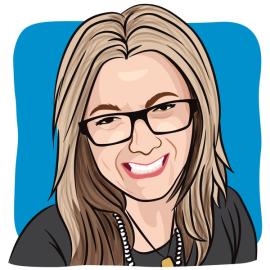- About Us
- Advertise / Support
- Editorial Board
- Contact Us
- CancerNetwork.com
- TargetedOnc.com
- OncLive.com
- OncNursingNews.com
- Terms & Conditions
- Privacy
- Do Not Sell My Information
- Washington My Health My Data
© 2025 MJH Life Sciences™ and CURE - Oncology & Cancer News for Patients & Caregivers. All rights reserved.
Finding Credible Voices in the Lynch Syndrome Community

Georgia Hurst is a fierce patient advocate for those with Lynch syndrome. Her advocacy work has afforded her opportunities to write for medical journals, various websites, books and genetic testing companies, and collaborate as a stakeholder for the National Academy of Sciences: Genomics and Population Health Collaborative. She is the co-creator of #GenCSM (Genetic Cancer Social Media) on Twitter.
When you’re living with a hereditary cancer syndrome, where you get your information matters just as much as the information itself.
I’m honored to be invited to participate in a panel discussion next month at the University of Sheffield in England, as part of the Previvorship in the Platform Society research project. The panel, titled “Shaping Good Social Media for Carriers of Hereditary Cancer Syndromes,” will explore what’s helpful, unhelpful and even harmful on social media when it comes to navigating diagnosis, prevention, surveillance, family conversations and interactions with healthcare providers. Living with Lynch syndrome means navigating lifelong risk — but the correct information and credible voices can turn fear into hope.
When I was first diagnosed, I did what most people do when faced with a life-changing genetic diagnosis — I went online searching for answers. I wanted guidance, comfort and a community to help me understand my new, unwelcome reality. It didn’t take long to realize that when you’re living with a hereditary cancer syndrome, where you get your information matters just as much as the information itself.
Years ago, when I created the hashtag #LynchSyndrome on Symplur under my Twitter handle @SheWithLynch, I wanted to make this syndrome more visible and connect with others living with it. Back then, there wasn’t much conversation online — just scattered medical papers and impersonal data, and genetic testing ads. I wanted to offer a voice rooted in experience, advocacy and compassion.
As awareness of Lynch syndrome grew, so did the noise online. Helpful stories and real resources began to appear — but alongside them came posts that fueled fear, spread questionable advice or turned hereditary cancer into a form of performance. That’s when I realized just how thin the line is between meaningful advocacy and anxiety in the digital age.
Social media can make complex genetics even more confusing. Social media posts promoting natural cures, misreading raw genetic data or questioning medical guidance can push people toward risky choices.
They may delay screenings, second-guess their doctors or spiral into panic. Sadly, fear spreads faster than facts, and in the midst of life-altering medical decisions, misinformation can be genuinely dangerous. Some survivor posts are honest and brave, sharing raw emotion and vulnerability. But others can be frightening — even paralyzing. They convey intensity without context, and for someone just beginning their Lynch syndrome journey, those words can feel like a death sentence rather than a call to action.
When Angelina Jolie publicly shared her BRCA status, she transformed how the world understood hereditary breast and ovarian cancer. Lynch syndrome doesn’t have a figure like that. And in that void, social media sometimes fills the space with people chasing attention rather than offering substance. Without credible voices at the forefront, many rely on anecdotal evidence rather than evidence-based medicine. That’s when misinformation takes root — and when people make decisions out of fear rather than knowledge.
In today’s political climate, where science and medicine can be politicized, it’s more important than ever to seek accurate, unbiased information. Misinformation about healthcare, genetics and prevention circulates rapidly, with devastating consequences. That’s why I now primarily turn to trusted, evidence-based sources like the National Comprehensive Cancer Network (NCCN), the American College of Gastroenterology (ACG) and the American Society of Clinical Oncology (ASCO). Most importantly, I relied on a certified genetic counselor— both before and after genetic testing. Certified genetic counselors interpret results accurately, explain personal risk, and help develop tailored care plans. Lynch syndrome isn’t one-size-fits-all; each mutation carries different risks and requires unique surveillance.
I don’t follow the #LynchSyndrome hashtag much anymore. There’s too much misinformation — and I’ve learned that protecting my peace of mind and time matters. These days, I choose to follow medical professionals, researchers, certified genetic counselors, some Lynch cancer survivors and aging previvors who are committed to truth, not trend. Their words don’t sensationalize; they educate. Their goal isn’t attention — it’s awareness.
Followers or hashtags don’t measure true advocacy. Advocacy is measured by intention, integrity and impact. When we uplift credible voices, challenge misinformation and share the real stories of those living — and thriving — with Lynch syndrome, we change the narrative. We move from fear to empowerment.
Living with Lynch syndrome means learning to live with uncertainty. But it also means choosing curiosity over fear, community over comparison, and accuracy over noise. When we lead with honesty, compassion, and intention, we give others something truly worth sharing: hope.
This piece reflects the author’s personal experience and perspective. For medical advice, please consult your health care provider.
For more news on cancer updates, research and education, don’t forget to subscribe to CURE®’s newsletters here.
Related Content:



